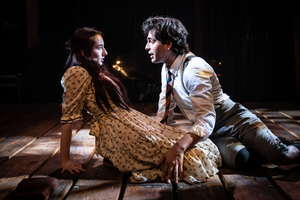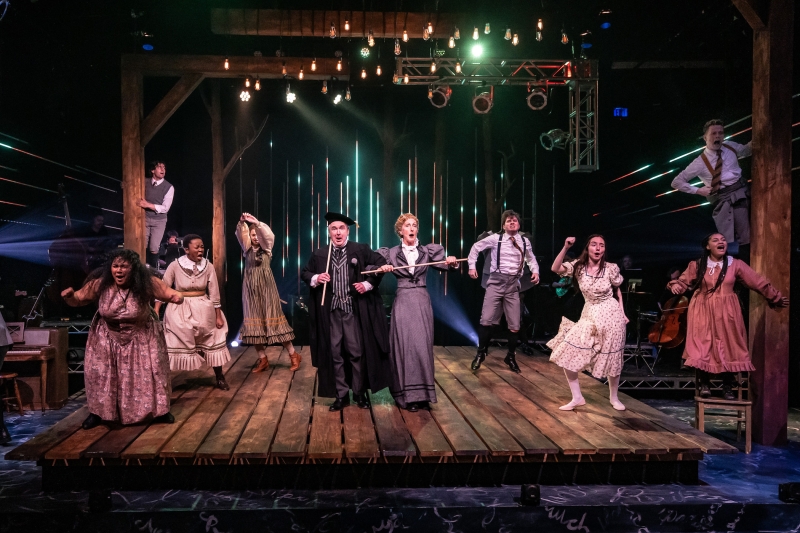Review: SPRING AWAKENING at Porchlight Music Theatre
Director and choreographer Brenda Didier's production of the 2007 Tony Award winner runs through June 2, 2022

SPRING AWAKENING, Duncan Sheik and Steven Sater's 2007 Tony Award-winning musical based upon the 1891 play by German playwright Frank Wedekind, brims with teen angst in its rock pop score and its lyrics that relay all the challenges of adolescence. The book and songs take an "everything but the kitchen sink" approach to the messiness of adolescence and the issues it raises: In just over two hours, the musical depicts first sexual experiences, masturbation, suicide, physical and sexual abuse, and illicit abortion. SPRING AWAKENING has always struck me as a heavy musical, but the Brechtian elements of the show also mean that the characters are not specifically developed. As with the original Broadway production, Brenda Didier's direction for Porchlight carries over the general spareness of the show. Christopher Rhoton's set design is a plain space: The actors pass over a floor composed of wood planks, and while there are no set pieces, they do use props. Bill Morey's costume designs root us in the repressed, buttoned up culture of late 1890s Germany, but that's contrasted with the anachronistic use of handheld mics that the actors pull out at charged moments. The orchestra is also visible on stage, contributing to the stripped down effect of the production design.
While I admire SPRING AWAKENING for communicating the perils of living in a repressed society and withholding vital information from young adults about their development and the experiences of adolescence and sex, I don't think Porchlight's production solves the problem that the show as written is as messy as adolescence itself. Sheik and Sater's songs are sometimes lovely, but the score is overall erratic. The show's opening number "Mama Who Bore Me" is a power ballad in which protagonist Wendla laments her mother's unwillingness to tell her the truth about sex (though, of course, Wendla doesn't yet understand what it is). But these more folksy numbers are contrasted with songs that have early 2000s emo pop punk influences. I like the latter elements of SPRING AWAKENING best, but the numbers don't all cohere.
Because the characters in SPRING AWAKENING are broadly drawn, it falls to the actors filling those roles to facilitate the connection between them and the audience. SPRING AWAKENING introduces us to Wendla (Maya Lou Hlava) and her classmates Ilse (Tiffany T. Taylor), Martha (Ariana Burks), Thea (Maddy Kelly), Anna (Sydney Monet Swanson). We also meet Melchior (Jack DeCesare) and his fellow classmates Moritz (Quinn Kelch), Georg (Juwon Tyrel Perry), Hanschen (John Marshall Jr.), and Ernst (Kelan M. Smith). To cement that SPRING AWAKENING focuses on the teenagers, McKinley Carter and Michael Joseph Mitchell play the roles of all the Adult Women and the Adult Men-and they're convincingly authoritative and stern. The musical posits that 1890s Germany (and, by proxy, today's world as audiences watch) is an adults' world so here the teens take back the power.
The musical also really wants audiences to root for Wendla and Melchior as its golden couple. Hlava, who herself is a teenager, is fabulous in the role. She's an expressive actor, and she wholly embodies Wendla's simultaneous naivete and curiosity about her sexuality and coming into adulthood. Hlava's vocals are also an elegant mix of sweet and powerful; she has an enjoyable tone, and her voice is well suited to this demanding part. Unfortunately, DeCesare doesn't match Hlava's energy or her vocal prowess. Melchior's vocal part calls for a full-throttled belt but also moments of falsetto, and DeCesare has to stretch at both ends to hit the notes. All together, Hlava's Wendla upstages DeCesare's Melchior. Likewise, as a result, the emphasis in certain moments shifts from solo or duet moments to the ensemble. For example, the act two uptempo song "Totally F*cked," which by far is my favorite number in SPRING AWAKENING, shifts from a Melchior-driven song to more of an ensemble feel as all the cast members scream and shout in the ultimate expression of teen angst. 
Aside from Hlava, SPRING AWAKENING's ensemble has a few other standouts. Taylor brings her breezy tone and powerful vocal control to Ilse's big duet with Moritz, "Don't Do Sadness/Blue Wind," and she's equally effective in "The Dark I Know Well" with Burks's Martha. Though I find the song creepy and excessively dark in the context of the show, Taylor and Burks find and nail the painful emotional truth of the song. Kelch is a treasure as Moritz; his elastic facial expressions bring an immediacy and focus to every moment he appears onstage. He also really leans into the pop punk influences on the vocals, bringing major Green Day vibes to "Don't Do Sadness." It all works so well, and Kelch really makes us root for his character who finds himself making a dire decision after failing out of school. Marshall Jr. brings some much needed humor into this dark musical as Hanschen, who forges a romantic connection with Ernst.
Porchlight's SPRING AWAKENING brings out moments of the raw emotion and many of the angsty vibes in the musical with Hlava's Wendla and Kelch's Mortiz as powerful anchors in this ensemble of moody teens (though, aside from Hlava, all the actors are past their teen days). While the production doesn't solve the musical's challenges of underbaked characters and heavy-handedness when it comes to the issues presented, Didier's direction and choreography bring us some nice tableaus, along with Justin Akira Kono's music direction that highlights the ensemble in key vocal moments.
Porchlight Music Theatre's SPRING AWAKENING plays at the Ruth Page Center for the Arts, 1016 North Dearborn, through June 2, 2022. Tickets start at $25. Visit PorchlightMusicTheatre.org.
Photo Credit: Liz Lauren
Review by Rachel Weinberg
Reader Reviews

Videos

